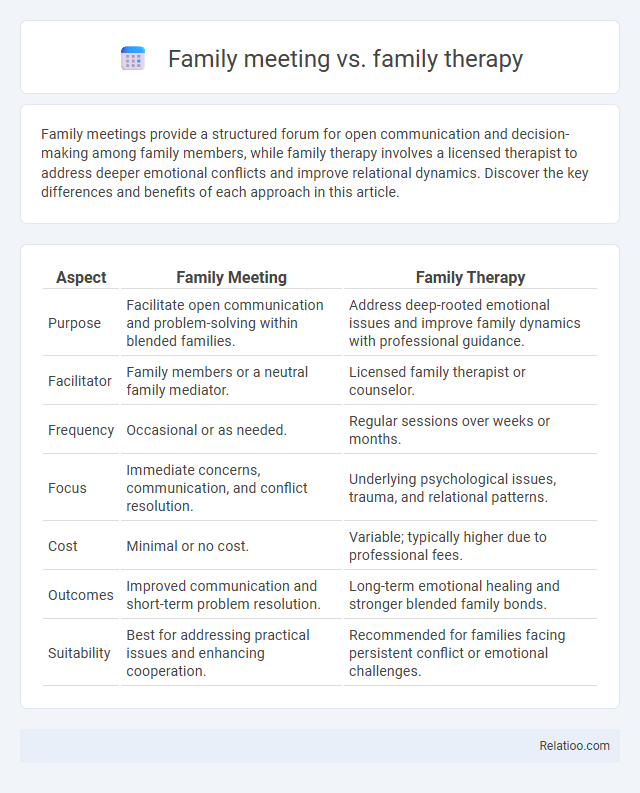Family meetings provide a structured forum for open communication and decision-making among family members, while family therapy involves a licensed therapist to address deeper emotional conflicts and improve relational dynamics. Discover the key differences and benefits of each approach in this article.
Table of Comparison
| Aspect | Family Meeting | Family Therapy |
|---|---|---|
| Purpose | Facilitate open communication and problem-solving within blended families. | Address deep-rooted emotional issues and improve family dynamics with professional guidance. |
| Facilitator | Family members or a neutral family mediator. | Licensed family therapist or counselor. |
| Frequency | Occasional or as needed. | Regular sessions over weeks or months. |
| Focus | Immediate concerns, communication, and conflict resolution. | Underlying psychological issues, trauma, and relational patterns. |
| Cost | Minimal or no cost. | Variable; typically higher due to professional fees. |
| Outcomes | Improved communication and short-term problem resolution. | Long-term emotional healing and stronger blended family bonds. |
| Suitability | Best for addressing practical issues and enhancing cooperation. | Recommended for families facing persistent conflict or emotional challenges. |
Understanding Family Meetings
Family meetings are structured gatherings to openly discuss household issues, set goals, and improve communication among members, while family therapy involves a trained therapist helping to resolve deeper emotional conflicts and relationship dynamics. Understanding family meetings centers on their role in fostering collaboration and problem-solving within the family unit without the need for professional intervention. Your ability to effectively conduct family meetings can strengthen bonds and prevent misunderstandings before therapy becomes necessary.
What Is Family Therapy?
Family therapy is a specialized form of counseling aimed at improving communication, resolving conflicts, and strengthening relationships within a family unit. Unlike family meetings, which are informal gatherings to discuss everyday matters, family therapy involves a licensed therapist guiding the family through structured sessions to address emotional and psychological challenges. This therapeutic approach helps identify underlying issues and fosters healthier dynamics through evidence-based techniques.
Goals of Family Meetings
Family meetings prioritize open communication and collective decision-making to strengthen relationships and resolve everyday issues within your family. Unlike structured family therapy led by licensed therapists focusing on mental health and behavioral challenges, family meetings aim to promote understanding, cooperation, and problem-solving in a supportive environment. The primary goal of family meetings is to create a safe space where all members can voice concerns, set shared goals, and enhance family dynamics without professional intervention.
Objectives of Family Therapy
Family therapy aims to improve communication, resolve conflicts, and strengthen relationships within the family system, focusing on psychological and emotional well-being. Unlike family meetings, which primarily address practical issues or decision-making, family therapy involves structured sessions led by a licensed therapist to explore underlying dynamics and promote healing. The core objective of family therapy is to create healthier family interactions and support mental health by addressing behavioral patterns and emotional challenges.
Key Differences: Family Meeting vs Family Therapy
Family meetings are informal gatherings aimed at discussing specific family issues or decisions, often led by a family member without a professional facilitator. Family therapy involves a licensed therapist who guides sessions to address deeper relational problems, improve communication, and resolve conflicts within the family system. The key difference lies in the structured, therapeutic approach of family therapy versus the casual, problem-solving nature of family meetings.
When to Choose a Family Meeting
Family meetings are informal gatherings aimed at improving communication and resolving daily issues, suitable when your family faces minor conflicts or needs to coordinate schedules. Family therapy involves structured sessions with a licensed therapist to address deeper emotional problems, relationship dynamics, or mental health concerns affecting the entire family. Choose a family meeting when the goal is to discuss practical matters and foster open dialogue without the need for professional intervention or emotional treatment.
When to Seek Family Therapy
Family meetings are informal gatherings to discuss routine issues or celebrate events, while family therapy involves structured sessions led by a licensed therapist aimed at resolving deep-rooted conflicts and improving communication. You should seek family therapy when persistent misunderstandings, emotional distress, or behavioral problems disrupt harmony and cannot be managed through regular family meetings. Professional intervention helps address complex dynamics, promote healing, and establish healthier patterns for long-term relationship improvement.
Role of a Facilitator in Family Meetings
Family meetings are structured gatherings led by a facilitator who ensures open communication, manages conflicts, and guides the family toward shared decisions, differing from family therapy where a licensed therapist addresses deeper emotional and psychological issues. The facilitator's role in family meetings focuses on maintaining a neutral environment and promoting collaboration, whereas family therapy involves therapeutic techniques to resolve underlying problems. Your active participation in family meetings under effective facilitation can strengthen communication and decision-making without the clinical focus of therapy.
The Therapist's Role in Family Therapy
The therapist's role in family therapy is pivotal, serving as a neutral facilitator who guides communication, resolves conflicts, and fosters emotional understanding among family members. Unlike family meetings, which are informal gatherings aimed at discussing everyday issues without professional intervention, family therapy involves structured sessions where the therapist applies techniques to address deeper psychological challenges affecting the family system. Your engagement with the therapist allows for targeted support in improving relational dynamics and promoting long-term healing and cohesion.
Benefits and Limitations of Each Approach
Family meetings foster open communication and immediate problem-solving among family members without professional intervention, promoting trust and cooperation but may lack structure and conflict resolution expertise. Family therapy, guided by trained therapists, offers structured sessions to address deep-rooted emotional issues, behavioral patterns, and mental health concerns, providing expert insights but requiring time, financial resources, and commitment. Family meetings offer flexibility and accessibility for everyday issues, while family therapy provides specialized support for complex dynamics, making the choice dependent on the severity of problems and desired outcomes.

Infographic: Family meeting vs Family therapy
 relatioo.com
relatioo.com